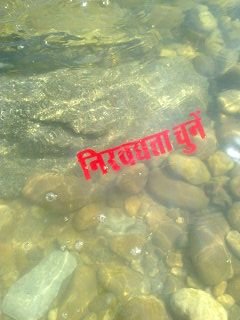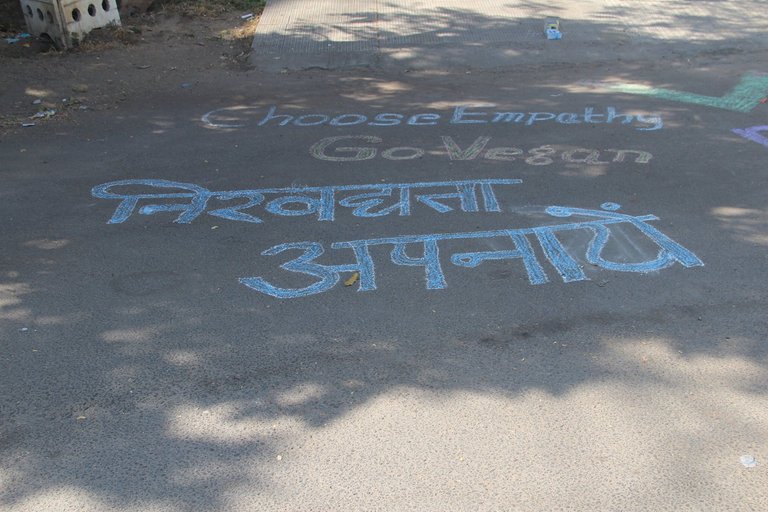So do you know what is "Vegan" called in your vernacular language?

(photographed by me).
What do "Vegan" mean? Is it different from "Vegetarian"?
If you are wondering what do Vegan mean, the term Vegan was coined in 1944 by Donald Watson in U.K. by omitting half of the middle letters in 'Vegetarian' to define a non-violent way of living. Donald realized that the term 'Vegetarian' was NOT a true representative of a non-violent lifestyle as it was just a type of diet and that too involved consumption of animal derived products like dairy, egg, honey etc. which is very cruel and violent facet of vegtarian life. Not only that, vegetarians also do not restrain from using several animal products & services which are not the part of their diet e.g. leather, silk, wool, fur, pearls, cosmetics with animal-tested or animal derived ingredients, circus, zoo, horse-racing, etc.
So the term vegan evolved and was defined to exclude all these.
But why do we need a word for "Veganism" in every language?
Well, every language evolves with the society to communicate and express the contemporary thoughts and concepts more precisely. All languages in the world keep acquire new words with the passage of time because if they don't keep pace with time, they gradually die their own death.
Over time, people began to understand the importance of adopting a vegan life and this realization slowly dawned upon them that veganism is the only logical way to sustain our own existence. Today, people practicing vegan life are increasing at an exponential rate and are present in almost ever country across the world. Many of them are non-English speakers. It is always difficult to explain the term "veganism" to non-English speakers and we need to talk to them in great detail to get them hold of its true meaning.
Aside that, the term "vegan" is always perceived as a foreign word being imposed on them. It denotes some foreign culture or a way of living not conducive to their land. Whereas, a word created in one's own native language is easy to grasp and relate to. Our own native language word generates a feeling of belonging, looks like just another normal word and is more readily acceptable to all native speakers. The etymological understanding of the root word also helps in grasping its exact meaning without much explanation.
Hindi is the national language of India and widely understood across the country and many other countries too. India also have one of the biggest population of vegetarians in the world. But concept of veganism isn't much popular so far. So whenever an author or a media journalist or an animal rights activist encounters the term 'vegan', it is mostly equated with 'vegetarian' or loosely translated into various words like:
शुद्ध शाकाहारी (pure vegetarian)
शुद्धतम शाकाहार (purest form of vegetarian)
अहिंसा आहार (non-violent diet)
फलभोजी (fruitarian)
जैन आहार (Jain diet - a diet followed by followers of Jainism)
But all these terms are no where close to veganism. All are concerned only with the diet part. But veganism is much beyond the diet. Hence these terms create more confusion than help dispelling it. In English too there are efforts to merge terms like vegetarian and vegan into one and is generally shortened as "veg", meaning of which people figure out according to their own understanding. But use of such ambiguous terms are very confusing. Sometimes people esp. vegan activist do it deliberately to sound more accommodating and acceptable to a larger vegetarian community. That is one of the reasons many vegans too are not clear what veganism is and take it as a cousin of vegetarianism. But in reality both are wide apart with hardly anything in common. So by creating a proper term in every language, apart from enriching the languages, confusions like these can be easily avoided.
So what is the right word for 'veganism' in Hindi?

My mother tongue is Hindi. And the word coined for vegan is निरवद्य. (pronounced as Nirvadya). But English language has only one word both for a vegan thing or a vegan person. Hindi do has some variations of this word. You may understand the meaning better by taking into account the following variations (of the root word "nirvadya (निरवद्य)"):
Vegan = निरवद्य (nirvadya)
Veganism = निरवद्यता (nirvadyata)
Vegan diet or plant based diet = निरवद्याहार (nirvadyaahar)
Vegan lifestyle = निरवद्याचार (nirvadyaachar)
One who follows vegan life style or veganism = निरवद्याचारी (nirvadyaachari)
Non-vegan or carnist = सावद्य (savadya)
Carnism = सावाद्यता or सावद्याचार (savdyata or savadyaachar)
Please note:
'Nirvadyata (निरवद्यता)' and 'nirvadyaachar (निरवद्याचार)' can be used interchangeably, most of the time.
You can however describe a vegan person as well as a vegan thing as "nirvadya" in Hindi, but you can not call a thing or a dish as 'nirvadyaachari', it applies only to a person.
So now you know what is veganism called in Hindi. Use it as much as you can. Using a proper word contributes to clarity in this already chaotic world. To make this word more known, I use it as my second name as I also think that this word defines my lifestyle more appropriately than the family name I inherited. A simple but an effective way for it, I feel. What are your opinions on this subject? Do share them freely with me.
When I'd translate this post in Hindi in future, I'd post a link to it in comments below.
भविष्य में जब इस पोस्ट का हिंदी अनुवाद किया जायेगा तो उसका लिंक नीचे कमेंट में पोस्ट किया जायेगा।
It's amazing how some languages are so much more expressive when it comes to specific words.
In English there is one word for love. I love my shoes, I love my Dog, I love my wife, I love God! In Greek there are 4 different words for four different types of love!
Rightly said! More the words a language has, more precisely one can express herself through that language. All our expression are only limited by the language. And sometimes a rich vocabulary help us discover our own self better through our own expressions. We also learn deeper about ourselves when we express ourselves better.
So nice to learn that Greek has got different words to express different types of love. Since we have only one word for love, I have no idea about various forms of love. I only know one love, the absolute love. Perhaps Greek know love better than us as they have analyzed it much more than others. So they created more words for it.
I only hope they are not compartmentalizing love 😜
By the way @kus-knee, it was really nice to see you here! I don't write too often, so my blog is not very crowded by visitors. Whenever you want some solitude and peace, you can come to my blog 😂 Jokes apart, you are always welcome here.
click here!This post received a 1.3% upvote from @randowhale thanks to @xyzashu! For more information,
My 2nd GiveawayCongratulations ! This post has received $0.12 upvote from @cryptokraze for participating in
Thank You
This post has received a 0.66 % upvote from @booster thanks to: @xyzashu.
This post has received a 100.00 % upvote from @zeroabsolut thanks to: @xyzashu.
This post gets a 0.07 % upvote thanks to @xyzashu - Hail Eris !
Would be great if you could write out a sentence in Hindi explaining what "vegan" means. I'm traveling in India right now and having trouble with communication of this. I'm just concerned with the dietary part for now. The rest is easy to care for myself.
For requesting a vegan diet, just ask for a vegetarian diet without any dairy & honey. Tell to serve a SHAKAHARI (veg.) Khaana (food) and emphasize with words like:
Doodh nahi (no milk),
Paneer nahi (no cheese)
Dahi nahi (no yogurt),
Ghee nahi (no clarified butter),
Makkhan nahi (no butter) and
Shahad nahi (no honey).
I hope it will work.
Wishing you a pleasant time in India.